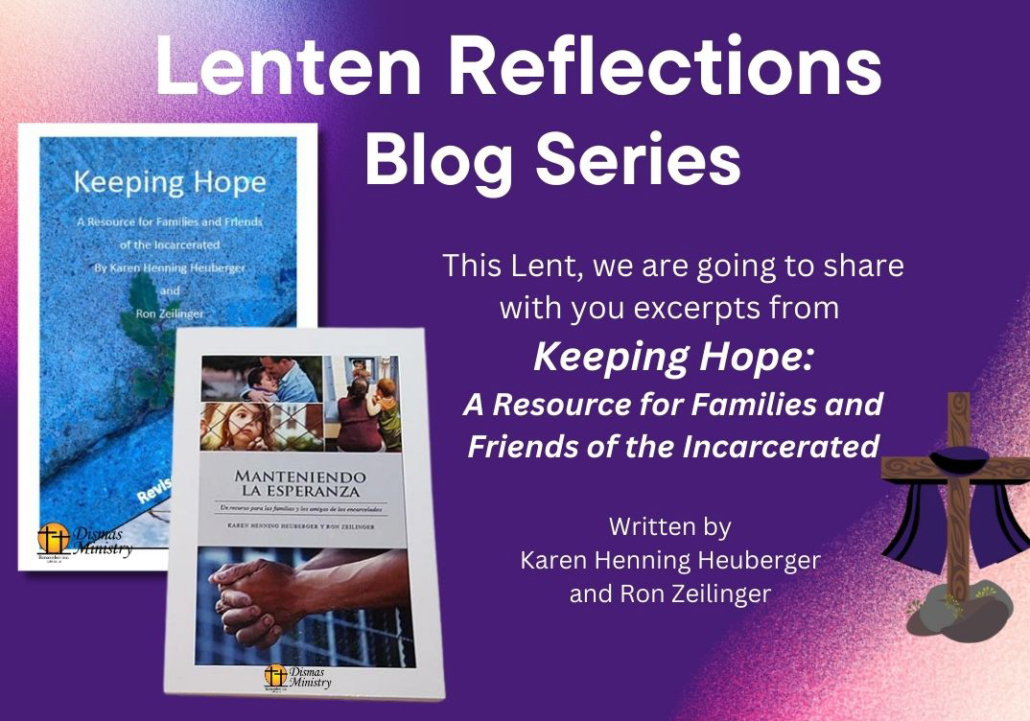This Lent, we are going to share with you excerpts from Keeping Hope: A Resource for Families and Friends of the Incarcerated
Written by Karen Henning Heuberger and Ron Zeilinger
“Being There: Supporting Your Loved One”
Don’t ever give up on them. Hate the sin but not the sinner.
One of the key ingredients in successful rehabilitation for inmates is family involvement. As the California Department of Corrections and Rehabilitation asserts, “Programs already in place in our state…show an enormous rehabilitative benefit from family interaction.” (Reform and Inform Newsletter, 2007) Furthermore, former Wisconsin DOC Secretary Gary Hamblin stated that “helping inmates maintain contact with their families while they are incarcerated also has an impact on recidivism and decreases their chances of re-incarceration.” (walker.wi.gov/press-release/governor-walker-miss-america-2012-announce-read-lead-book-bridge-program).
 When your loved one goes to prison, you must make the decision if you are going to be committed to supporting him or her or not. Once you have decided to support the person, truly commit. Don’t be lukewarm. The more you can show healthy support, the better off he or she will be both during and after incarceration. Do not give up on him or her, especially if this is a first-time offense. Look past what happened and remember the person you love.
When your loved one goes to prison, you must make the decision if you are going to be committed to supporting him or her or not. Once you have decided to support the person, truly commit. Don’t be lukewarm. The more you can show healthy support, the better off he or she will be both during and after incarceration. Do not give up on him or her, especially if this is a first-time offense. Look past what happened and remember the person you love.
For some, the commitment to support your loved one may not happen right away. It may take a sincere letter from him or her as an indication of real change, an effort on the part of the prisoner, or just finding a common ground as you rebuild your relationship. But even if the reconnection comes near the end of the sentence, it is not too late. Doing what you can to support the person at any point of the incarceration can make a difference.
Because your loved one doesn’t truly know what is going on in your life, he or she has to completely trust you and the information you give. Do what you can to build that trust. Be consistent with writing, visiting, talking on the phone. Be encouraging. Make sure the inmate’s name is called often when the mail is handed out in the facility. Send something extra around the holidays. Send pictures, anything with color, things that are allowed but not seen in a prison. Demonstrate your support and that you haven’t forgotten about your relationship. Keep the communication open and flowing.
Helping support your loved one’s faith-life is another important aspect of his or her rehabilitation. Pray together when you can, do bible studies together, and share your faith experiences – all one’s spiritual life. This can help you, too. Both of you growing in faith together not only helps you bond, but helps both of you cope and develop in healthy ways.
Supporting your family member or friend involves both emotional and financial support. People who don’t have anyone to help financially are more isolated. They have no money for personal things that can be purchased in the commissary. So if you can, make sure there is money in the prisoner’s account for the phone and the commissary. Often, there are easy online methods for putting money into your loved one’s account. For example, in Texas there is e-CommDirect (tdcj-ecommdirect.portal.texas.gov/). This service allows you to make online purchases from the commissary which will be delivered to your loved one, or put money directly into your loved one’s account online. Similar to this is JPay (www.jpay.com). Available in more than 30 states, JPay allows you to not only send money to your loved one’s account, but also emails and music. Other services are video visits if the facility participates in this option.
 Educate yourself on any conditions your loved one may have, whether they are mental or physical illness, or an addiction. The more you understand, the more you can support him or her and the more you can advocate if needed. You may also need to educate yourself on legal issues, especially if your loved one plans to make an appeal. While there is some legal help available inside the prisons, you may be the best advocate in your family member or friend’s case.
Educate yourself on any conditions your loved one may have, whether they are mental or physical illness, or an addiction. The more you understand, the more you can support him or her and the more you can advocate if needed. You may also need to educate yourself on legal issues, especially if your loved one plans to make an appeal. While there is some legal help available inside the prisons, you may be the best advocate in your family member or friend’s case.
Advocating for Your Loved One
Advocating for a prisoner can take various approaches. It depends on each person. One way is simply being the person’s advocate within your family. You may need to speak up for him or her with members of the family who are not so supportive. You may not get them to start writing or visiting, but just helping family members understand the situation better can promote an attitude of reconciliation or at least tolerance.
Advocating within the system may present more formal involvement. At the time of sentencing, you may be able to give input as to what you think your loved one needs as part of his or her program (i.e. drug treatment, anger management, etc.) Some states have councils made up of inmate families to help resolve issues during incarceration, such as the Ohio Department of Rehabilitation and Correction (ODRC) Family Council.
Otherwise, you may simply have to be willing to take a stand on your own. For example, your advocacy may revolve around a condition your loved one has. If you are not happy with the medical care the prisoner receives, you may need to speak up on his or her behalf. There is a usually a process set up in the system – either at the correctional facility or at the state Department of Corrections level — to make a complaint, but if you are not getting the response you need, you may need to contact the ombudsman or other appropriate person in the system. If your loved one has mental illness, you may have to advocate for the person just to get needed treatment, whether it is counseling or medication. Keep asking “who else might help with this?” until you reach the right person.
If you need to advocate for your loved one on a legal level, i.e. making an appeal, you may feel out of your league. But there are options for getting legal help. Often the prison has a legal expert who can give advice. You can also do your own research. Some organizations, such as The Innocence Network, will provide free assistance in certain types of cases. More generally, there is some form of a Legal Aid Society ready to provide help.
READ MORE FROM KEEPING HOPE BY PURCHASING YOUR COPY ON OUR STORE PAGE.



